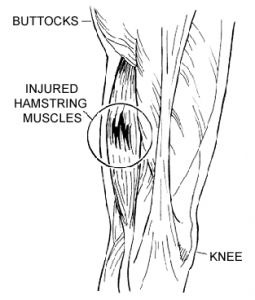Sport Rehabilitation and Physiotherapy for Hamstring Strains
What is a Hamstring Strain?
An excessive stretch or tearing of muscle fibres and related tissues. This can occur in the muscle belly or at the attachments which are the bony prominence felt under each “cheek” when sitting and behind the knee.
What Causes a Hamstring Strain?
Often caused by a sudden stretch or a rapid contraction against resistance and the muscle is more vulnerable to tearing as it crosses two joints. Factors that increase susceptibility to tearing include; “tight” hamstrings, imbalance between hamstring and quadricep strength, poor posture, poor core stability, fatigue and inadequate warm-up.
What are the symptoms of a Hamstring Strain?
Pain on activity i.e. when stretching or contracting the muscle usually deep within the mid – section of the muscle or at the upper attachment. Swelling and bruising may be present in more severe strains. If left untreated fibrosis may occur with scar tissue replacing normal contractile tissue. This dysfunctional healing mixed with immobilisation can lead to tightness and shortening of the muscle that may predispose to further strains. This can impair activities such as walking, running and sport.
What will treatment consist of for a Hamstring Strain?
Massage – Encompassing a variety of techniques with sufficient pressure through the superficial tissue to reach the deep lying structures. It is used to increase blood flow, decrease swelling, reduce muscle spasm and promote normal tissue repair.
Deep friction – An aggressive massage technique applied across the tissue as deeply as possible to break down scar tissue, restore normal movement and prepare the structure for mobilisation or manipulation. This technique is initially painful but then causes a numbing effect.
Mobilisation – A manual technique where the joint and soft tissues are gently moved by the therapist to restore normal range, lubricate tissues and relieve pain.
Ultrasonic Therapy – Transmits sound waves through the tissues stimulating the body’s chemical reactions and therefore healing process, just as shaking a test tube in the laboratory speeds up a chemical reaction. It reduces tissue spasm, accelerates healing and results in pain relief.
Interferential Therapy – Introduces a small electrical current into the tissues and can be used at varying frequencies for differing treatment effects. E.g. pain relief, muscle or nerve stimulation, promoting blood flow and reducing inflammation.
What other treatments could be used for a Hamstring Strain?
Acupuncture – An oriental technique of introducing needles into the skin to increase or decrease energy flow to promote pain relief and healing.
Taping/Strapping – May be used if thought necessary to restrict abnormal movement and prevent further damage.
What can you do yourself to help a Hamstring Strain?
Active Rest – Keep active but avoid activities that aggravate your condition i.e. any activity that places repetitive strain on your hamstring, such as running or lifting heavy weights at the gym.
Apply an ice pack – For a maximum of 20 minutes. A bag of frozen peas wrapped in a damp cloth works well because it moulds to the shape of the tissues. Ensure that you do not apply ice directly to the skin as this can cause an ice burn.
Contrast bathing – From 5-days post injury apply a heat pack that is as hot as you can withstand for 5 minutes followed by a cold pack that is as cold as you can withstand for 5 minutes and repeat for approximately 20 – 30 minutes.
Exercise programme – This is the most important part of the rehabilitation. Your therapist will instruct you as to which exercises to begin with, when to add the others, as well as how to progress the exercises.
Medication – Ask your GP or Pharmacist for advice on the best medication for your condition.
Podiatry – An analysis of the foot mechanics and structure during walking or running and correction as appropriate.
What if physical therapy does not help or resolve a Hamstring Strain?
It is very rare that treatment does not resolve this condition. In these cases we will refer you on for further investigation.
If you think you may have this condition we would love the opportunity to show you our expertise in the treatment and management of this condition so – Please click here for details of how to contact us to book an appointment
If you are unsure whether you have this condition or you would just like to speak to somebody then please get in touch here or call 0161 745 7551 or 0151 515 2323.

